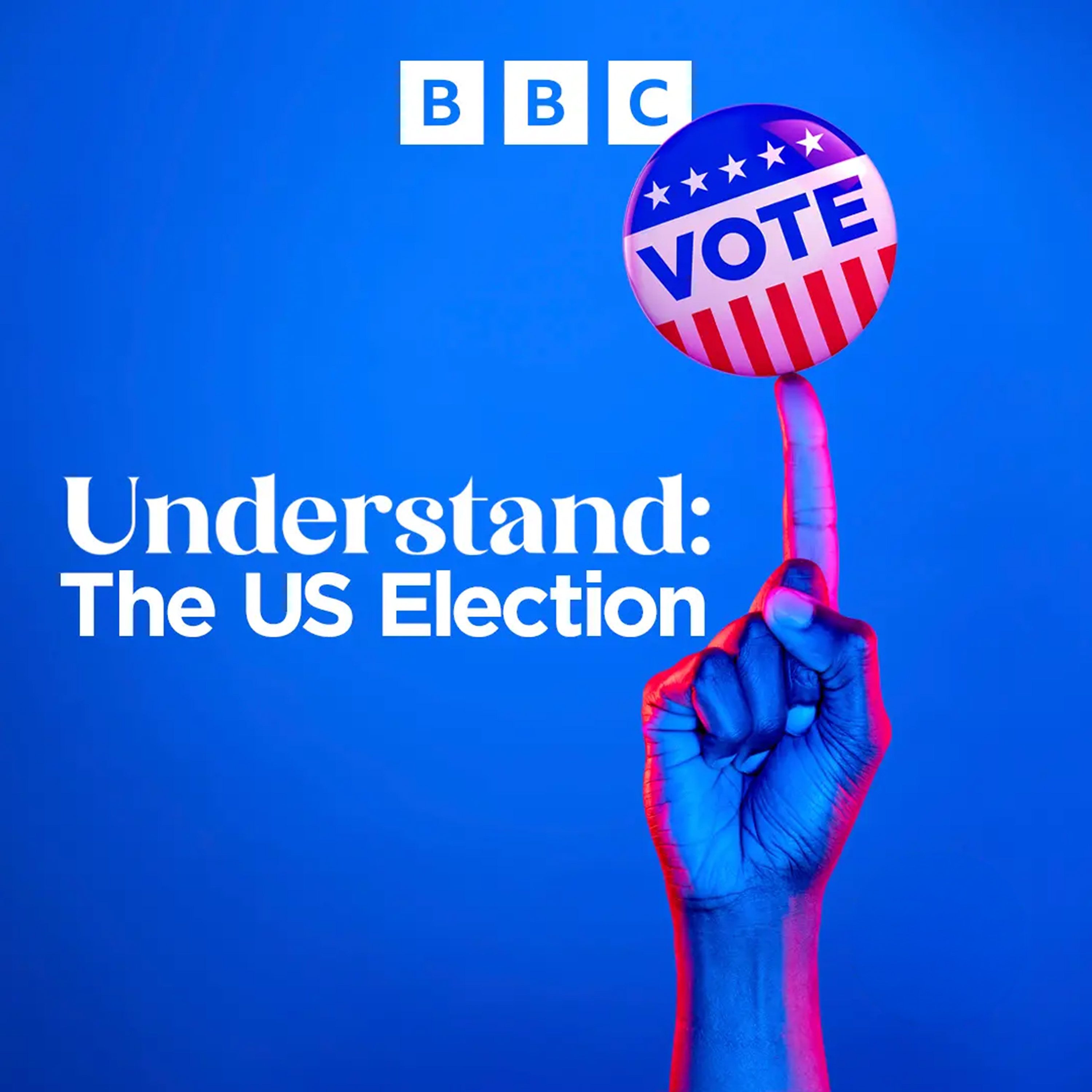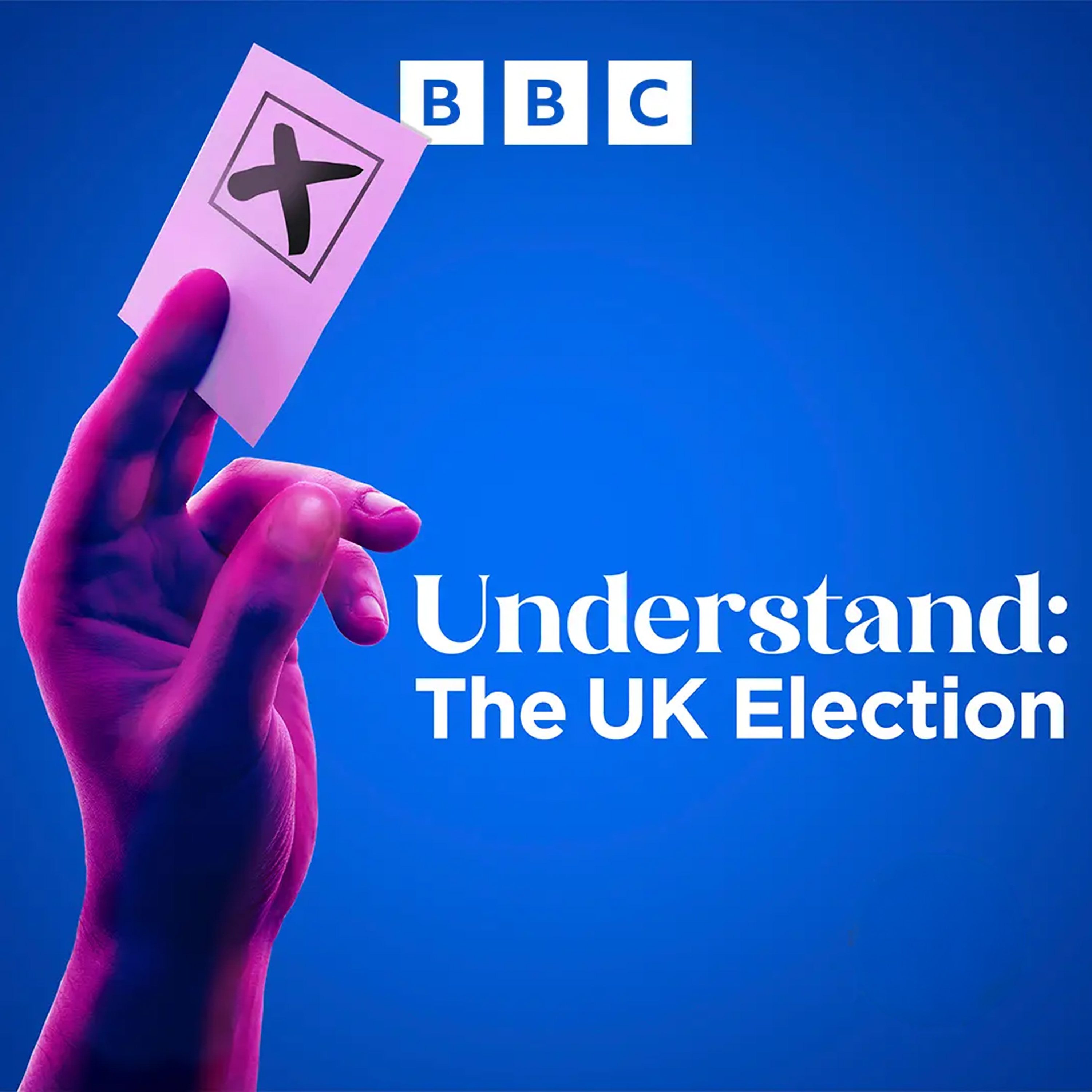The US Election: 4. The General Election
In the penultimate episode, Justin Webb and guests discuss what happens on election day -- and how the notorious electoral college system works.
Press play and read along
Transcript
Speaker 1 BBC podcast is supported by ads outside the UK.
Speaker 2 Juvederm Collection of Fillers.
Speaker 3 I have lots of sides.
Speaker 3 My visionary side.
Speaker 3 My hands-on side.
Speaker 3 My tasteful side.
Speaker 3 I have lots of sides. And every side is me.
Speaker 2 Juvederm Collection of Fillers.
Speaker 2 For every side of you. Add volume to specific areas of the face to get smooth, natural-looking, long-lasting results.
Speaker 2 For more important safety information and to find a licensed specialist, visit juviderm.com. That's j-u-v-ed-d-er-r-m.com.
Speaker 2 Not for people with severe allergic reactions, allergies, celidocaine, or the proteins used in juvoderm.
Speaker 2 Common side effects include injection sight redness, swelling, pain, tenderness, firmness, lumps, bumps, bruising, discoloration, or itching.
Speaker 2 There's a risk of unintentional injection into a blood vessel, which can cause vision abnormalities, blindness, stroke, temporary scabs, or scarring.
Speaker 2 Talk to a licensed specialist to find out if it's right for you.
Speaker 4 Coach, the energy out there felt different. What changed for the team today?
Speaker 1
It was the new game day scratchers from the California Lottery. Play is everything.
Those games sent the team's energy through the roof.
Speaker 4 Are you saying it was the off-field play that made the difference on the field?
Speaker 1
Hey, a little play makes your day, and today it made the game. That's all for now.
Coach, one more question.
Speaker 4 Play the new Los Angeles Chargers, San Francisco 49ers, and Los Angeles Rams Scratchers from the California Lottery. A little play can make your day.
Speaker 4 Please play responsibly, must be 18 years or older to purchase, play, or claim.
Speaker 2 BBC Sounds, Music, Radio, Podcasts.
Speaker 5 Hello, and welcome to Understand the U.S. Election, your essential election year guide to how the next American president will be chosen.
Speaker 5 My guests and I will deal with the basics, from how the big party candidates are selected to what happens on the campaign trail, all the way through to election night and beyond, to the inauguration, and crucially, why the winner is not always the person with the most votes.
Speaker 5
And we'll have a few lessons from history along the way. My name is Justin Webb.
I am one of the hosts of AmeriCast, our BBC Sounds podcast on all things American.
Speaker 5 I spent many years living there as the BBC correspondent in Washington and eventually as North America editor when Barack Obama was winning power.
Speaker 5 Today we're chatting about Election Day and the counting of the votes and one of my brilliant AmeriCast co-hosts is here to share his expertise, Anthony Zerker, the BBC's North America correspondent.
Speaker 5 Howdy Anthony.
Speaker 6 Hi there, Justin. Great to be here.
Speaker 5
And our guest today, Mary Frances Berry, Professor of American Social Thought History and Africana Studies at the University of Pennsylvania. Dr.
Berry, hello to you.
Speaker 7 Thanks for having me.
Speaker 5
Let me ask you the first question, Dr. Berry.
What actually happens on election night?
Speaker 7 What happens on election night is the collection of the votes, the ballots that have been cast, and the counting of them by election officials in each state, because it is a state-driven process.
Speaker 7 And then trying, once they're counted,
Speaker 7 to say that they're certified and then to announce to the public that X or Y or Z got so many votes in whatever state it is.
Speaker 7 And then everybody holds bated breath to see when it goes over what they think is the threshold of so many million votes and maybe translating into electoral college votes because you really didn't vote for the people you're voting for.
Speaker 7 You voted for the electors of the people you're voting for, who are the people who will then then be the ones who will cast the ballots that will be seen in Washington.
Speaker 5
Let me turn on to Anthony now. Anthony, Dr.
Berry brings up the Electoral College, meaning what?
Speaker 6 The Electoral College is the system that the U.S. uses to determine its presidential elections.
Speaker 6 And in each state, they get a certain number of votes for president, and that's roughly dependent on the population of the state. So a big state, say like California, gets 54 votes.
Speaker 6 A smaller state like Wyoming gets three. And if a candidate wins a plurality in a state, in all but a few cases, they get all of those states' electoral votes.
Speaker 6 So what a plurality means is that a candidate doesn't win a pure majority, that is 50% plus one, but wins the most votes even if it isn't a majority.
Speaker 6 So you win a plurality in California, you get those 54 votes. Now when you combine all the states on the American map together, candidates are trying to hit a magic number of 270 electoral votes.
Speaker 6
That is roughly half of the 538 total electoral votes that are at play on the American political map. Now, if no one reaches that 270, then the U.S.
Congress has to get involved. Very complicated.
Speaker 6
I won't go into that. And these are actually individual electors in the Electoral College.
That's kind of an archaic thing as well.
Speaker 6 Although I will remind you that in 2020, Donald Trump in his campaign tried to put forward his own electors to claim that Donald Trump won in certain states, not Joe Biden.
Speaker 6 That includes in Michigan and Georgia and several other states.
Speaker 5
Dr. Barry, it's obviously a complicated system.
Why?
Speaker 5 What was the thinking behind it?
Speaker 7 The Electoral College system made sense. to the founders at the time.
Speaker 7 One of their biggest problems was making sure that they could reconcile the interests of all of the states in order to get a constitution. Their main goal was to get a constitution for the nation.
Speaker 7 We weren't establishing a democracy. We were trying to make the small states, big states all join together and approve a constitution.
Speaker 7 And also, they didn't know we were going to have political parties.
Speaker 7
They weren't even thinking about that. It was a federal system which relies on state power to an extent.
And so they did it for all these reasons.
Speaker 7 It was not a system to try to trick people or make it complicated or anything like that, but just to make everybody comfortable with the way the power was balanced.
Speaker 5 Is it fair to say that the system, though, has drawbacks in the modern era?
Speaker 7 Oh, absolutely. But the problem with trying to get rid of the Electoral College is that you have to get some of the states that benefit from it to actually agree that you should get rid of it.
Speaker 7 Think of how hard that would be.
Speaker 5 So we have a situation then, Anthony, where you need to win in the Electoral College, but That means that you can become president, can't you, without winning a majority of the votes that have been cast?
Speaker 6
Absolutely. It kind of boggles the mind, but in 2000 and again in 2016, the Republican, George W.
Bush, and then Donald Trump, won the presidency without winning a plurality of the popular vote.
Speaker 6 And the way that happens is, say, the Democrat racked up big margins in a place like California or New York, while the Republican won very narrowly in some Midwestern states.
Speaker 6 So when you look at the vote totals throughout the entire United States, it actually doesn't help the Republicans, but because of the way the electoral map is drawn and the way this is a patchwork of battleground states, that will determine who's the president.
Speaker 6 And I'll add that the electoral map shifts over time. The total number of electoral votes has been set at 538 for some time.
Speaker 6 But every 10 years, the United States takes a census. They determine how many people live in each state.
Speaker 6 They reallocate congressional representation, which then affects how the electoral map votes are tallied. So you see a state like Florida gaining an electoral vote.
Speaker 6 You see a state like New York losing an electoral vote over 2020.
Speaker 6 So in 2024, while the map will look somewhat similar, there are some little shifts that make a big difference if it's a close election.
Speaker 5 And Anthony, that then brings us to this question, going back to election night. In general terms, how quickly and with what degree of certainty do we know who's won?
Speaker 6 You know, the United States is a big country and it has multiple time zones and in the evening the polling places close at a set time and so you have the polling places close on the East Coast before they close in California and certainly before they close in Alaska or Hawaii.
Speaker 6 So what you see is a kind of a rolling tally of what's happening in all these states, which makes for a very dramatic evening as American public sits there and looks at the vote tallies.
Speaker 6 And it is actually the media that makes predictions about who's going to win each state.
Speaker 6 So you'll see your local television anchor or a BBC presenter come on and say we can now predict that say Donald Trump won the state of Florida.
Speaker 6 That doesn't mean that he's been certified, signed, sealed, and delivered and won that state, but looking at the results in that state and looking at the demographics and looking at the places that haven't reported their votes yet, you can make a fairly accurate prediction, a highly accurate prediction in this case because the stakes are very high about who is going to win that.
Speaker 6 And then you wait as these polls close across the United States, moving farther and farther out west, to see if anyone can reach that 270 electoral vote mark.
Speaker 6 And that is when, again, it is the media that declares who the expected winner is.
Speaker 6 It still takes time after that for the vote results to be certified, and then ultimately for the Electoral College ballots to be passed along to Congress where they are officially tabulated.
Speaker 6 And then that is when the official winner of a presidential election is declared.
Speaker 5
Right. So it doesn't happen the day after the the election itself, Anthony.
There's no official winner declared until it happens in Congress.
Speaker 6 Exactly. Individual states will certify their election results, will send those certifications to Congress, and they have deadlines in November or December to do that.
Speaker 6 But it is not officially official until the beginning of January when Congress takes action.
Speaker 5
Dr. Berry, we know that the last election, the 2020 election, was bitterly contested.
We know all about that. Take us back into history to a previous election, the contested election of 2000.
Speaker 5
So Al Gore standing for the Democrats against George W. Bush for the Republicans.
And the state that decided it all was Florida, where the result wasn't clear, was it?
Speaker 7 What happened in 2000 was that a lot of people claimed that they were not counted or even permitted to vote.
Speaker 7 People were complaining from Florida to government agencies and to anybody they could find that they were excluded from the ballot, that they went down to vote and nobody would let them vote.
Speaker 7 There were people who were disabled who said that when they got to the place to go to vote, they found out that there were no elevators and it was like 15 flights up that they were supposed to walk and they couldn't.
Speaker 7 There was this one black guy who said that he had been voting in every election.
Speaker 7 He went down and took his children and they told him that he wasn't on the rolls and he said he felt like he'd been kicked back into slavery.
Speaker 7 But a lot of events happened and the governor was Jeb Jeb Bush, his brother, which made it kind of suspicious for some people. And there were protests.
Speaker 7 This protest will continue until there is a revolt in Barbicane.
Speaker 7
The contestation was a call for recount. The Supreme Court eventually decided a case in which they approved the count the way it was done and gave the election to George W.
Bush.
Speaker 7
Now, Albert Gore did not have to count those ballots. He could have asked for a committee.
He could have done all kinds of things, but he didn't.
Speaker 7 And he said he did what he thought was good for the country. And in retrospect, that was probably right.
Speaker 8
Just moments ago, I spoke with George W. Bush and congratulated him on becoming the 43rd President of the United States.
And I promised him that I wouldn't call him back this time.
Speaker 8 I offered to meet with him as soon as possible so that we can start to heal the divisions of the campaign and the contest through which we've just passed.
Speaker 8 Almost a century and a half ago, Senator Stephen Douglas told Abraham Lincoln, who had just defeated him for the presidency, partisan feeling must yield to patriotism. I'm with you, Mr.
Speaker 8 President, and God bless you.
Speaker 5 Okay, and of course, things happened at the last election, didn't they, Anthony, when it came to allegations of voter fraud, Donald Trump, his team challenging the outcome of that election.
Speaker 5 So looking ahead to this election,
Speaker 5 how much of an impact is allegations of voter fraud and the fact of those allegations having been made last time going to have on the outcome, do you think, and on what goes on?
Speaker 6 Well, I think as long as Donald Trump's on the ballot, there are going to be allegations of voter fraud.
Speaker 6 I mean, Donald Trump, obviously, everyone remembers 2020, but even in 2016, when he won, he made allegations of massive voter fraud.
Speaker 6
When he lost the Iowa caucuses in 2016, he made allegations of voter fraud. So I think you're going to see that again.
There are some differences between 2020 and 2024.
Speaker 6 First of all, Donald Trump isn't in office, so he doesn't have his controls on the levers of power.
Speaker 6 And also, 2020 was right in the midst of the coronavirus pandemic, and that meant that a lot of states changed their voting rules. rules.
Speaker 6 Absentee mail-in balloting was much higher, a proportion of the voting, than perhaps it will be in 2024 that some state courts changed how those absentee ballots were counted which raised a lot of anger from republicans so it will still be something that is hanging over the election certainly because of what happened in 2020 but it may not be quite as big a factor that's it folks hopefully we all understand what happens on election day a little better now mary frances berry thanks so much for joining us thank you for having me And Anthony as well.
Speaker 6 My pleasure.
Speaker 5 And remember, if you want to keep up to date with everything that's going on during the 2024 elections, you can do it by listening to Americast, available weekly on BBC Sounds.
Speaker 5
The next episode of Understand the U.S. Election will be all about the power of the president, what happens when they step inside the Oval Office.
See you all later.
Speaker 2 From BBC Radio 4.
Speaker 9 Life can be unexpected.
Speaker 1 It was big.
Speaker 1 This was not a wind. This was not a storm.
Speaker 10 This was a tsunami.
Speaker 9 But when confronted with change, humans are remarkably resilient.
Speaker 11 I knew in that moment as I fell to the ground that I would recover more.
Speaker 9 I'm Dr. Shawn Williams, psychologist and presenter of Life Changing, the program that speaks to people whose worlds have been flipped upside down and transformed in a moment.
Speaker 10 If I had to live my life again, would I ever want to go through what I went through? There's a very simple answer to that. I would go through it again.
Speaker 9 Subscribe to Life Changing on BBC Sounds.


